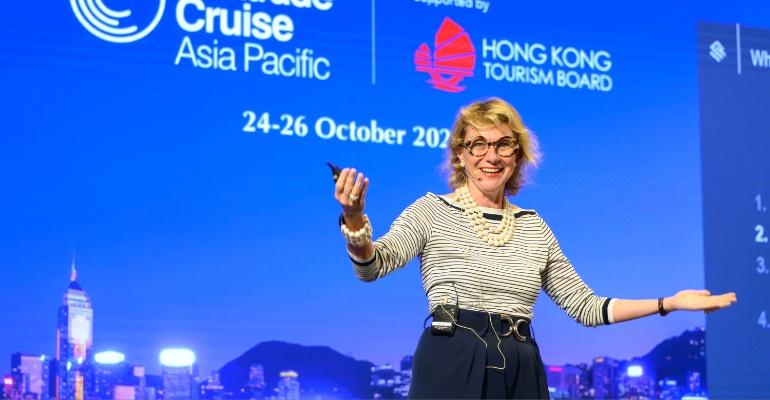The cruise line president took a deep dive into luxury cruising in the ‘Luxury Cruising in Asian Waters’ keynote address yesterday at Seatrade Cruise Asia Pacific (October 24-26) taking place at the JW Marriott Hotel Hong Kong.
‘The consumer has changed,’ she said, explaining that North America – the second largest luxury market in the world after Asia, with China in the forefront – is seeing a change in baby boomers' behaviour. ‘How do they spend their money? They spend it on travel. So there is this incredible shift, which is already happening here in the United States and in Europe, in which instead of buying more jewels, they’re buying more experiences.
The last three years have seen fundamental changes in traveller behaviour. Some 49% of people are flying less often and staying for longer, 51% prefer experiences over goods, compared to 9% for the latter, 59% plan on using travel advisors for half or more of their bookings, and 50% are embarking on ‘revenge travel’ - making up for time lost during the pandemic.
Wealth, but little time
Compared to the US and Europe, Asia is 'slightly different. We still see, particularly from the younger demographics, a huge consumption of durable goods and fashion, which is great for the global economy. But we're seeing this broader trend of increasing experiences going faster and faster.’
Muckermann went on to explain there is a pool of wealthy individuals in Asia with little time but the means and willingness to travel to unique, luxury destinations. The line’s fly-cruise Antarctica product, a six-day experience made possible by charter flight, is ‘super popular with wealthy Chinese people …they don't care that the product is more expensive.'
In China, eight of 10 individuals are more willing to pay for experiences over tangible products. Some 72% plan on taking longer trips, vacationing from six to 10 days per trip, and 70% wish to take slow, recuperative travel over an activity-packed itinerary. Some 60% consider natural scenery as their first priority.
The paradox
Muckermann stated that ‘luxury today is abused, everything is luxury,’ which leads us to reflect on what real luxury is and its nuances.
‘In reality, the luxury industry is built on a paradox,’ she said. ‘Because the more desirable a brand becomes, the more it sells, the more it sells, the less desirable it becomes,’ citing former Hermès CEO Patrick Thomas.
‘This is really the biggest challenge for luxury today because we all want to grow. But we need to apply the right strategies to be able to segment the market in a way in which that single consumer still feels part of an elite and feels very special.’
Hotels
‘The biggest issue of the luxury cruise industry is that we are the best kept secret in the industry,’ said Muckermann. As a result, Silversea ‘welcomes enormously’ luxury hotel groups entering the cruise market, with the potential for more cruisers to stumble across the cruise line ‘at some point.’
Following Muckermann’s presentation, delegates were invited to Hong Kong’s Victoria Harbour to see Silver Muse sail away, illuminated by the light show, ‘A Symphony of Lights.’
Copyright © 2024. All rights reserved. Seatrade, a trading name of Informa Markets (UK) Limited.
Add Seatrade Cruise News to your Google News feed.  |

